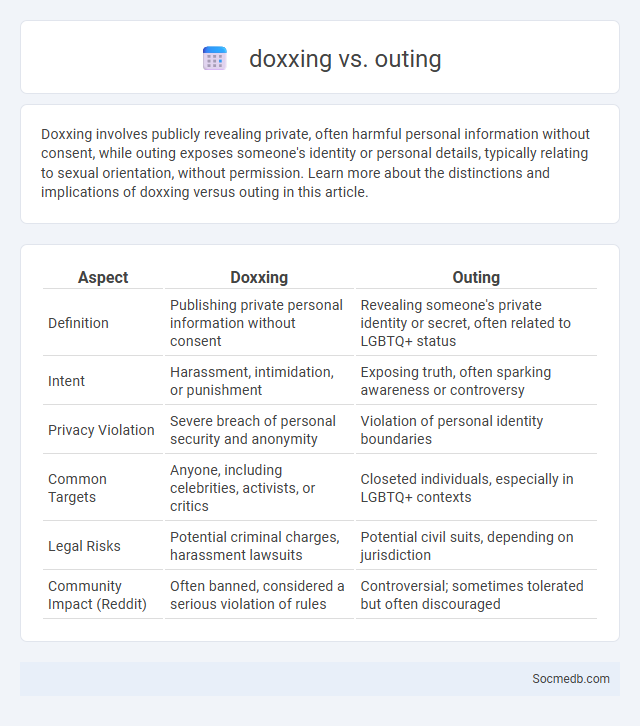
Photo illustration: doxxing vs outing
Doxxing involves publicly revealing private, often harmful personal information without consent, while outing exposes someone's identity or personal details, typically relating to sexual orientation, without permission. Learn more about the distinctions and implications of doxxing versus outing in this article.
Table of Comparison
| Aspect | Doxxing | Outing |
|---|---|---|
| Definition | Publishing private personal information without consent | Revealing someone's private identity or secret, often related to LGBTQ+ status |
| Intent | Harassment, intimidation, or punishment | Exposing truth, often sparking awareness or controversy |
| Privacy Violation | Severe breach of personal security and anonymity | Violation of personal identity boundaries |
| Common Targets | Anyone, including celebrities, activists, or critics | Closeted individuals, especially in LGBTQ+ contexts |
| Legal Risks | Potential criminal charges, harassment lawsuits | Potential civil suits, depending on jurisdiction |
| Community Impact (Reddit) | Often banned, considered a serious violation of rules | Controversial; sometimes tolerated but often discouraged |
Understanding Doxxing: Definition and Origins
Doxxing is the practice of publicly revealing private or identifying information about an individual without their consent, often to harass or intimidate them. Originating from the hacker culture in the 1990s, the term derives from "dropping docs," referring to the release of documents or personal data online. This harmful act exploits social media platforms, where vast amounts of personal data can be easily accessed and disseminated rapidly.
What is Outing? Key Differences from Doxxing
Outing on social media involves publicly revealing someone's private or sensitive information without their consent, often tied to personal aspects such as sexual orientation or beliefs. Unlike doxxing, which specifically entails exposing private details like home addresses or phone numbers to intimidate or harass, outing focuses more on disclosing personal truths to an audience. Both actions breach privacy, but outing centers on personal identity revelations while doxxing targets physical and contact information.
Personal Information Doxxing Explained
Personal information doxxing involves the malicious act of publicly revealing your private data such as home address, phone number, or financial details on social media platforms without consent. This violation of privacy can lead to identity theft, harassment, and severe emotional distress. Protecting your online presence by managing privacy settings and being cautious about the information you share is crucial to prevent doxxing incidents.
Motivations Behind Doxxing and Outing
Doxxing and outing on social media are often driven by motivations such as seeking revenge, exposing perceived wrongdoings, or asserting power over others. Perpetrators may aim to damage reputations or intimidate targets by publicly revealing private information, leveraging the platforms' extensive reach. This behavior reflects underlying social dynamics where anonymity and digital footprints intersect, amplifying the consequences of online actions.
Privacy Risks: How Doxxing and Outing Impact Individuals
Doxxing and outing on social media expose individuals to significant privacy risks by revealing sensitive personal information without consent, leading to harassment, identity theft, or emotional distress. Cybercriminals and malicious actors exploit public profiles and shared data to target You, compromising your safety and digital security. Protecting privacy settings and limiting personal disclosures online are crucial steps to mitigate these dangers.
Legal Implications: Is Doxxing or Outing Illegal?
Doxxing and outing individuals on social media platforms can lead to serious legal consequences, including charges of harassment, invasion of privacy, and cyberstalking, depending on jurisdiction. Many countries have specific laws prohibiting the unauthorized sharing of personal information that exposes individuals to harm or threats. Victims of doxxing may pursue civil lawsuits for damages, while perpetrators face potential criminal penalties under data protection and anti-harassment statutes.
Ethical Considerations: Public Interest vs. Privacy
Balancing public interest with privacy on social media requires strict adherence to ethical guidelines to protect user data while promoting transparency. Platforms must implement robust privacy policies and consent mechanisms to prevent unauthorized data exploitation and respect individual rights. Ensuring accountability through regulatory compliance and ethical moderation enhances trust and safeguards both societal welfare and personal confidentiality.
Preventing Doxxing and Outing: Strategies for Protection
Implementing strong privacy settings and using pseudonyms are critical strategies for preventing doxxing and outing on social media platforms. Regularly reviewing friend lists and being cautious about sharing personal information minimize exposure risks to cyber harassment. Utilizing two-factor authentication and reporting suspicious activity immediately enhance protection against malicious attempts to reveal private data.
Real-World Cases: Doxxing vs. Outing Incidents
Real-world cases highlight the critical differences between doxxing and outing incidents on social media, where doxxing involves maliciously revealing private personal information to harass or threaten, while outing refers to disclosing someone's sexual orientation or identity without consent, often with complex social implications. Your awareness of these distinctions can help navigate online interactions more ethically and protect privacy rights. Understanding high-profile incidents, such as the doxxing of journalists or the outing of LGBTQ+ individuals, sheds light on the legal and emotional consequences involved in each scenario.
Responding to Doxxing: Steps to Take if Targeted
If targeted by doxxing on social media, immediately document all evidence, including screenshots and URLs, to support potential legal action. Report the incident to the platform's moderation team to remove harmful content and consider adjusting privacy settings to limit further exposure. Contact local law enforcement and seek support from organizations specializing in online harassment to ensure personal safety and recovery.
 socmedb.com
socmedb.com